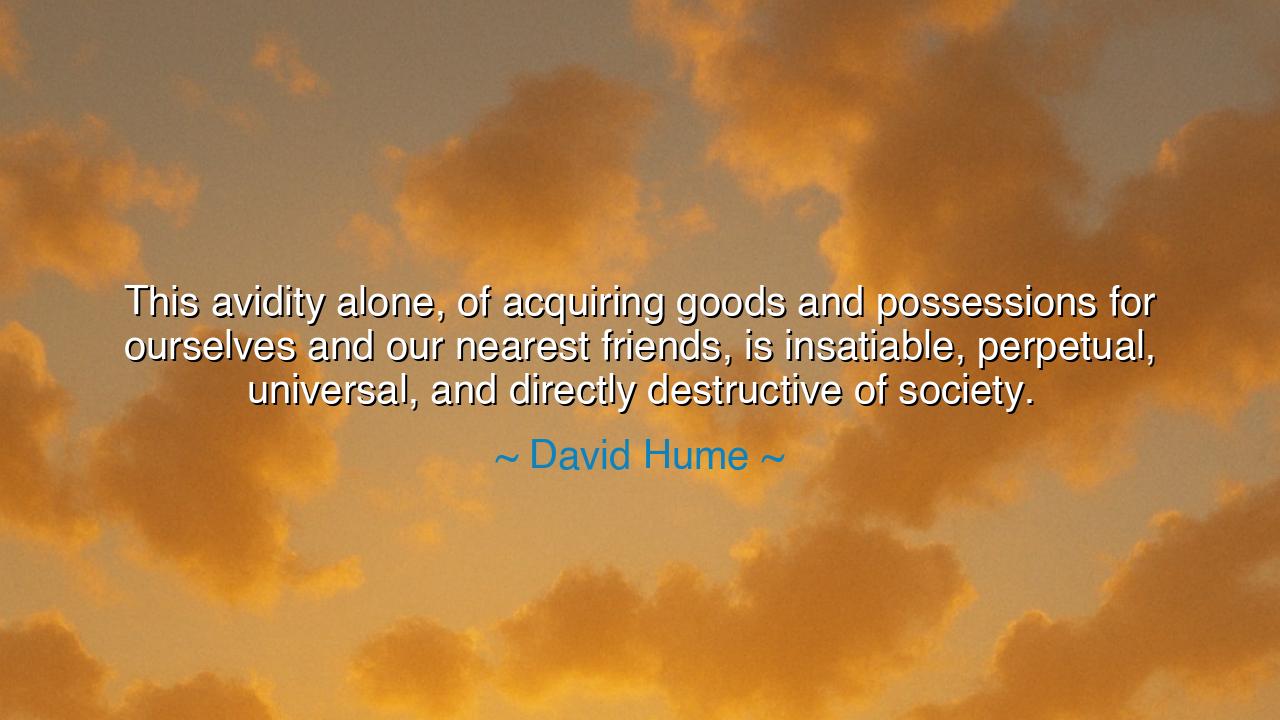
This avidity alone, of acquiring goods and possessions for
This avidity alone, of acquiring goods and possessions for ourselves and our nearest friends, is insatiable, perpetual, universal, and directly destructive of society.






“This avidity alone, of acquiring goods and possessions for ourselves and our nearest friends, is insatiable, perpetual, universal, and directly destructive of society.” — Thus spoke David Hume, the philosopher of reason and reflection, whose words pierce the heart of human nature like the edge of a tempered blade. In this single thought, he reveals one of the great truths of civilization: that the hunger for possession, when ungoverned by virtue, devours not only the soul of the individual but the harmony of the whole. Hume’s insight is not a sermon against wealth itself, but a warning against the spirit that worships it—the avidity, the feverish craving that blinds the eyes and hardens the heart.
The origin of these words lies in Hume’s reflections on the moral foundation of society. He saw that every community, from the smallest village to the mightiest empire, rests upon a fragile bond of trust and justice. Yet this bond is daily corroded by the selfish passion to acquire, to gather more for oneself and one’s kin, as though happiness were a treasure that could be stored in chests and guarded by locks. To Hume, such desire was not merely personal folly—it was a universal contagion, an insatiable thirst that no abundance could ever quench. It begins with the individual, but it spreads like fire, consuming the peace of families, the fairness of commerce, and the stability of nations.
Consider the fate of Ancient Rome, that grand empire which once ruled from the sands of Africa to the hills of Britain. In its infancy, Rome was nourished by virtue, by the simplicity of its citizens and the discipline of its soldiers. But as her coffers swelled with the gold of conquered lands, the spirit of avidity took root. Senators sought not honor but estates, generals waged war not for glory but for spoils, and the people themselves grew addicted to spectacle and grain. The wealth of the world lay at their feet, yet their hearts grew poor. The insatiable desire for possessions became the poison of the Republic, and in time, it destroyed the very order it had enriched. Thus, Rome perished not from enemies without, but from greed within.
And what Hume saw in Rome, he saw mirrored in all human ages. The perpetual hunger for more—more wealth, more comfort, more power—is not the mark of a wicked few, but a universal temptation. It is the same hunger that drives the merchant to deceit, the ruler to oppression, the friend to betrayal. When men measure their worth by what they own rather than what they are, they lose the capacity for virtue. And when an entire people falls under this spell, their society becomes a battlefield of desires—each man against his brother, each house against its neighbor. The laws may still stand, but their spirit is gone, for justice cannot live where greed is master.
Yet, dear reader, this truth need not lead to despair. For though the impulse to possess is universal, so too is the power to restrain it. The ancients spoke of moderation—that noble art of knowing when enough is enough. The wise man, they said, is not the one who owns the most, but the one who desires least. True riches lie not in abundance, but in freedom from want. When a man’s heart is content, no king is richer; when it is enslaved by greed, no beggar is poorer. This is the balance Hume sought to restore—a society not of renunciation, but of restraint; not of poverty, but of justice.
Let the example of the Stoics guide us. They lived amidst empire and fortune, yet found their peace in simplicity. Seneca, tutor to Nero, possessed great wealth, but taught that riches are only tools, not masters. “It is not the man who has little, but the man who craves more, who is poor,” he said. Such wisdom is not ancient alone—it is eternal. In our age, too, the fever of acquisition burns bright. The screens we gaze into, the markets we chase, all whisper the same false gospel: that happiness can be bought, that fulfillment lies in gain. But Hume’s warning still resounds across the centuries, as timely now as when first written.
Therefore, the lesson is this: Guard your heart against the tyranny of possession. Seek justice before wealth, virtue before comfort, and peace before power. Be not the slave of desire, but its master. In your home, in your work, in your dealings with others, let generosity temper ambition. Possess what you need, share what you can, and be content with what is enough. For a society is destroyed not by famine or war alone, but by the silent corrosion of selfishness.
And so, remember Hume’s wisdom: avidity is the root of decay, but moderation is the seed of harmony. The man who conquers his desire to possess conquers himself—and in that conquest lies the salvation of both the soul and the state.






AAdministratorAdministrator
Welcome, honored guests. Please leave a comment, we will respond soon